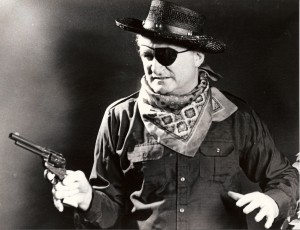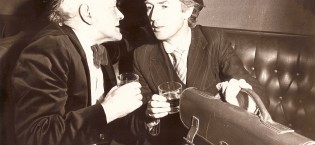Cormac’s Classics
 Twenty seven years an actor with practically every local drama group that has come and gone in that time, and a former Chairman and Treasurer of Sligo Drama Circle, Cormac Sheridan is one of the great characters of the local drama scene. A Dubliner by birth, but by now a naturalised Sligoman and proud of it, Cormac’s involvement in drama started as a hobby but very quickly became a way of life, and he candidly concedes, “If you were to take drama out of my life, then a very large slice of my life would be gone”. Not, mind you that he was stuck for something to while away the hours. A keen sportsman, he played in goal for Shelbourne in the League of Ireland, played senior rugby for Clontarf and found time to work on his golf handicap as well. But it was the drama bug which cut deepest. His first encounter with the stage was with the ESB Musical and Dramatic Society, shortly after he began work as an accountant. As well as doing a few shows with the society, Cormac also made a couple of television adverts for domestic appliances, for which he was handsomely paid, but his TV career was cut short when Equity learned of his “double jobbing”. Fate took a hand when, on being transferred to Sligo, Cormac spent three months in lodgings at the Bonne Chere, owned and run by Walter and Kay Mc Donagh.
Twenty seven years an actor with practically every local drama group that has come and gone in that time, and a former Chairman and Treasurer of Sligo Drama Circle, Cormac Sheridan is one of the great characters of the local drama scene. A Dubliner by birth, but by now a naturalised Sligoman and proud of it, Cormac’s involvement in drama started as a hobby but very quickly became a way of life, and he candidly concedes, “If you were to take drama out of my life, then a very large slice of my life would be gone”. Not, mind you that he was stuck for something to while away the hours. A keen sportsman, he played in goal for Shelbourne in the League of Ireland, played senior rugby for Clontarf and found time to work on his golf handicap as well. But it was the drama bug which cut deepest. His first encounter with the stage was with the ESB Musical and Dramatic Society, shortly after he began work as an accountant. As well as doing a few shows with the society, Cormac also made a couple of television adverts for domestic appliances, for which he was handsomely paid, but his TV career was cut short when Equity learned of his “double jobbing”. Fate took a hand when, on being transferred to Sligo, Cormac spent three months in lodgings at the Bonne Chere, owned and run by Walter and Kay Mc Donagh.
“Walter and Kay were like parents to me. It’s probably true to say I would never have become involved in drama in Sligo, but for my friendship with them. Once it became know that I had done a bit of acting in Dublin, there was no way I could avoid being involved here”, Cormac recalls. At that time, the Sligo Drama Circle was at its peak, and there was a great “buzz” about the Festival circuit. Cormac was carried away with the passion of it all, and he recalls many happy hours spent in the company of men like Walter Mc Donagh, Paddy Dooney and Liam Mc Kinney. It’s a source of pride that he played a prominent part in the Drama Circle’s first All-Ireland winning production, “A Streetcar Named Desire”, directed by Liam Mc Kinney. “The play was a bit controversial at the time, and there were those who felt we were foolish to go on the Festival circuit with it. Indeed, I recall we got a particularly good going-over from an adjudicator in Ballyshannon, but that only served to make us more determined. There was a great sense of satisfaction and justification when we eventually won the All-Ireland title. It was a great honour at the time, and the achievement has stood the test of time”, Cormac maintains.
Indeed, Cormac believes that two subsequent Drama Circle productions, “Death of a Salesman” and “The Crucible”, in which he played prominent roles, were at least as good as the All-Ireland winner, but they were overlooked for the ultimate prize. “I think there was probably a bit of politics at work, insofar as there would have been a reluctance to give the premier award to Sligo in consecutive years, but we all felt genuinely that we had produced a few really good plays. And, even without awards, there was a great satisfaction in knowing you were doing something well, and that audiences were getting value for money”. Naturally, there was a lot of hard work invested in those productions – so much so that Cormac believes the present generation have things “soft” by comparison. “Don’t get me wrong”, he explains, “I’m full of praise for the work being done by people like the Fun Company, The Blue Raincoats and Everyman. My point is that we had such sparse facilities, and yet we turned out great work. Rehearsal facilities were primitive, and while the Town Hall was adequate, it was not very practical. For instance, just imagine hauling sets and props up those stairs in the Town Hall. We had to do that for every production. By those standards, the Hawks Well is the lap of luxury, and I often wonder do the present groups realise just how lucky they are”.
It wasn’t all hard work, of course. The meticulous preparation and the endless hours of travelling to festivals all over the country had its own appeal and the memories are obviously precious. One example: “I remember we got lost one night coming home from a festival in Co. Tyrone. Lionel Gallagher, Liam Mc Kinney and myself went off in search of a phone kiosk. We eventually found one, and Liam telephoned the local RUC station, to see if they could give us an idea of how to get back o the right track. ‘Where are you now?’ enquired the police officer. ‘Jaysus, if I knew that I wouldn’t be lost’. Gallagher and Sheridan dancing in convulsions on the street only added to the mayhem.
As one who has appeared in many of the classic Irish plays over the years, Cormac doesn’t agree with the view expressed in this column in the recent past that some of the old classics are over-done on the local stage. “I don’t think it’s a legitimate criticism at all”, he contends. “We’re talking about classic works, and there will always be a demand for them. In England, for instance, the Royal Shakespeare Company was set up to perpetuate the work of Shakespeare and to bring it to different generations. We should not have to apologise for doing the same sort of thing for our own classic writers. The reason they are done so often is because there is always a demand for them. Take a film classic like Casablanca. Would anyone seriously suggest that it should not be shown again , simply on the basis that it has been seen so often already? Of course not. Because it’s such a classic, people will always want to see it , and it’s the same with plays by O’ Casey, and Synge. We have to remember too that American visitors coming here don’t want to see the Irish trying to produce French or American plays. They want to see the Irish classics, and people involved in drama production have a responsibility in that regard. From an actor’s point of view, I have done all the classics over the years, but I still find them fresh and challenging. I don’t believe there’s any reason for us to feel uncomfortable about doing them so often”.
Having worked with so many local groups – he has appeared in over fifty plays in the last quarter of a century – Cormac acknowledges the huge wealth of local theatrical talent (both on and off stage), but he would like to see more co-operation between the various groups. “A lot of the old barriers are gone, which is a good thing, but I think there’s room for even more liaison between the various groups. Then if we were all to sit down together at the beginning of the year and plan a calendar in order to avoid clashes, that would be an advantage. But, generally, there seems to be a better mix than there used to be, and that’s as it should be, he maintains. While full of admiration for local talent, he is not so complimentary when it comes to the general public’s support of theatre in Sligo. “You get shows like ‘Dancing at Lughnasa’ and Dermot Morgan packing out the Hawks Well, but how many of these people go and support local shows. I find that a bit tough for the local companies. I’m not convinced that the public generally is as supportive of local theatre as it should be”, Cormac says.
Now in the last week of hectic rehearsal for the Drama Circle’s production of “Juno and the Paycock”, which opens next week, Cormac is as infectiously enthusiastic as ever. A perfectionist, he says he would be hell to work with as a director, because he would be so demanding. “I’m not an easy person in rehearsal, because I have certain standards which I set for myself and which I like others to match. If you’re charging people good money to come in and watch, and they are considerate enough to come and see you, then you owe it to them to give it your best shot. I don’t think that’s too much to ask of anyone”. He has great time for the play’s director, Frankie Brannigan, and others he mentions as heroes include Kathleen O’ Hara, the late Paddy Dooney (“the best actor I have ever worked with”), Eddie Fitzpatrick and Liam Mc Kinney. “I don’t think the drama community in any other town in the country could afford to lose men of that calibre and still survive. It is a great tribute to those who carry on the tradition that is as strong as ever and long may it continue”, he says.
An interview by Jim Gray in The Sligo Champion, February 4th, 1994
Tags: History, Reflections









thank you to Sligo Drama Circle for the lovely article about Cormac. He was very happy when he was involved with the Drama Circle. He was very proud when ye won the All Ireland Title in Athlone. Love to anyone who remembers us. Joan.
I’m sure there are lots of Sligo people will have fond memories of Cormac and the many roles he played on the stage.